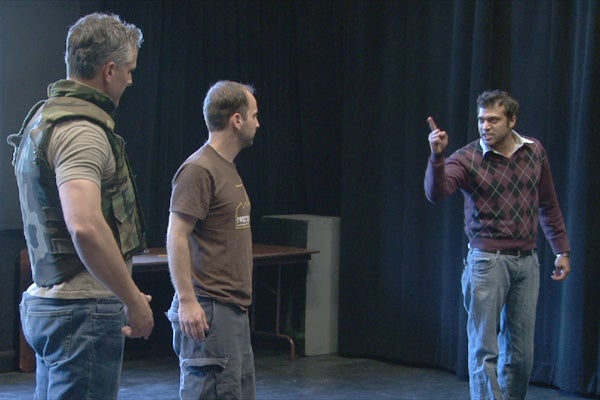|
Video available here
May 17, 2011
In the Stanford performance of Betrayed, George Packer tells the sad story of Iraqi interpreters and drivers abandoned by the Americans
New Yorker staff writer George Packer wrote Betrayed after interviewing three-dozen Iraqi translators. By Steve Fyffe

Actors rehearse a tense scene from George Packer's play Betrayed, which explores the difficult lives of Iraqi translators working for the U.S. military. (Photo by Steve Fyffe / Stanford News Service) New Yorker magazine staff writer George Packer's feelings about the way the U.S. government has treated the Iraqis who worked for it in post-Saddam Iraq are summed up in the one-word title of his play: Betrayed.
"Iraqis risked their lives going to work every day," Packer said by cell phone while walking from the subway to his home in New York. "We could not have done a day's work without them as interpreters and drivers and contractors. And yet their lives didn't seem to matter beyond the services they provided."
Betrayed will be performed at Stanford on Friday, May 20.
Packer reached his conclusion after interviewing three-dozen Iraqi translators during a 2007 reporting trip that took him to Sweden, Jordan, Syria and Iraq. Many former translators had fled the country in fear for their lives, only to spend years as refugees in bureaucratic limbo, waiting for the U.S. visas they'd been promised in return for their services. Those still in Iraq were left to defend themselves and their families against religious extremists who wanted to kill them because they'd worked for the Americans.
"They had no one to defend them," Packer said. "They didn't have their own militia. They didn't have the Iraqi military police, who often thought of them as traitors. And they didn't have the Americans. Individual Americans cared, but institutionally, the U.S. government was washing their hands of this terrible problem."
The 16,000-word article he wrote for The New Yorker magazine helped raise awareness in Washington, where the State Department started to expedite U.S. visas for Iraqis who had worked with the occupation forces. But Packer said he still had more to say, so he wrote his first play.
"This one came quickly and easily, because I had the pent-up feelings, and the vivid experiences were very fresh from that reporting trip. I was angry. I was impassioned. I thought these voices needed to be heard."
While Packer emphasized that Betrayed is a work of fiction, he said he relied heavily on his interviews with Iraqi translators as source material.
"Roughly 20 to 30 percent of the dialogue was directly taken from transcripts of my interviews," Packer said.
"It really did reach American audiences in a way that news stories just can't, because it was the voices of the Iraqis that were talking to them, and for an hour and 45 minutes, they were put into their clothes and into their skins."
Tickets are already sold out for the single performance of Betrayed at Annenberg Auditorium on Friday, May 20. If there are any unclaimed seats, they will be released at 7:50 p.m.
However, Packer is scheduled to give an on-stage talk, which is open to the public, at 7 p.m. on Thursday, May 19. He'll be discussing the play with author and creative writing Professor Tobias Wolff and philosophy Professor Debra Satz as part of the "Ethics and War" series.
His visit to Stanford will be a homecoming for Packer, who grew up around the campus. His father, Herbert Packer, was a popular law professor who spent 16 years at Stanford, rising through the administrative ranks to the level of vice provost. His mother, Nancy, was a long-time professor of creative writing. Packer said he has many happy memories of those days.
"I loved going to Stanford football games and running onto the field," he said. "I loved riding my bike with friends to Tresidder and getting a cheeseburger when I was 10 . . . it was a pretty idyllic place to grow up."
That idyllic life was shattered after his father suffered a stroke and then committed suicide when Packer was 12, an experience he recounts in his autobiographical family history, Blood of the Liberals.
Packer angered many liberal fans when he confessed in his 2005 book, The Assassin's Gate, that despite his many misgivings, he had initially been in favor of the invasion of Iraq, an opinion he says he did not publicly express before the start of the war. His many reporting trips to Iraq since have tempered his views, and he now believes that the war turned out to be a disaster and a tragedy.
But Packer warned that audience members who come to Betrayed expecting a liberal screed against the U.S. occupation may be disappointed.
"Audiences in New York that brought political views to the play were often flummoxed by it," Packer said. "There were talk-backs afterwards by Iraqi interpreters, and the somewhat simple views that Americans brought with them to the play were complicated by the stories and thoughts of the Iraqis."
-30-
|